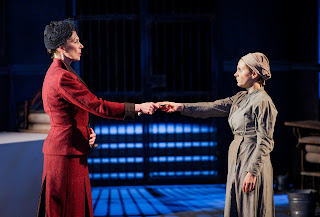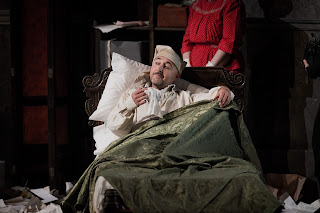 |
| Puccini - Il Tabarro - Opera Holland Park - photo Robert Workman |
Reviewed by Robert Hugill on Jun 02 2015
Star rating:
Classy ensemble in a strong production of Puccini's underrated operas
Opera Holland Park launched its 2015 season with bang, with a production of Puccini's Il trittico, a challenging work which is still not as frequently performed as it deserves. With three different operas in contrasting styles and effectively requiring three different casts, Opera Holland Park's production of Il trittico showed the company to be on top form.
 |
| Anne Sophie Duprels as Suor Angelica and Rosalind Plowright as La Zia Principessa in Suor Angelica. Photo Robert Workman |
Anne Sophie Duprels sang both Giorgetta in Il tabarro and the title role in Suor Angelica, with Stephen Gadd as Michele, Jeff Gwaltney as Luigi, Sarah Pring as Frugola, Aled Hall as Tinca and Simon Wilding as Talpa in Il tabarro.
In Suor Angelica, Rosalind Plowright was La Zia Principessa, Fiona Mackay was La Badessa, Laura Woods was La Suora Zelatrice and Kathryn Walker was La Maestra delle Novizie, with Johane Ansell as Suor Genovieffa, Kathryn Hannah as Suor Osmina and Rosanne Havel as Suor Dolcina.
In Gianni Schicchi, Richard Burkhard sang the title role with Sarah Pring as Zita, Anna Patalong as Lauretta, James Edwards as Rinuccio, Elin Pritchard as Nella, Simon Wilding as Betto, William Robert Allenby as Simone, Ian Beadle as Marco and Chloe Hinton as La Ciesca.
The 2012 production of Gianni Schicchi had been set in the 1940's and for Il trittico, Martin Lloyd-Evans, Oliver Platt and Neil Irish set all three operas in the same time-period. Also linking the three physically, Neil Irish had designed a facade of arches which formed the flexible backdrop for all three sets and helped to reflect the voices into the auditorium, always a help as there is no pit and Puccini uses a large orchestra.
 |
| Stephen Gadd as Michele in Il tabarroPhoto Robert Workman |
Stephen Gadd's Michele was a slightly sad, worn down figure and you felt for him in the opening scenes as he was rebuffed by Giorgetta, but he brought a nice sense of how attractive Michele may once have been in his solos. Anne Sophie Duprels was a feisty, strong minded Giorgetta, ground down perhaps but still with a strong will. Her duet hymning the glories of Paris with Jeff Gwaltney's Luigi as glorious. There was a sense, perhaps, that the role took Annn Sophie Duprels to her vocal limits, and there were moments which did not sound quite ideally free. But then, there are very few sopranos around nowadays who can fulfil all of Puccini's requirements. Here Anne Sophie Duprels showed she had both the delicacy and the power reserves necessary.
Jeff Gwaltney was a robust Luigi, and for once we had a tenor with the requisite physique to make us believe Luigi hauled sacks for a living. Jeff Gwaltney's voice might be robust, but his performance was not without finesse and was very endearing. We had slightly less sense of Luigi's interior life than we did with Michele and Giorgetta, but partly this is because Puccini gives the singer less to work with.
The supporting characters were all strong and what was notable about the performance was how it was a real ensemble without any sense of any of the characters, even the major ones, standing out too much. Sarah Pring made a delightful Frugola, but scary too and she was superb in the moment when we realise that she has guessed about Giorgetta and Michele. Aled Hall and Simon Wilding were the characterful and contrasting stevedores, whilst Johane Ansell and James Edwards were suitably rapturous as the lovers, with Peter Davoren in the cameo role of the song vendor.
 | |
| The cast of Suor AngelicaPhoto Robert Workman |
Whilst the setting was highly effective and Oliver Platt made good use of it in his production, I did have something of a slight problem with it. The whole tenor of the piece seemed to be based on a distrust of religion. In Puccini's original the young novices are there for a variety of reasons, and some willingly, whilst the regime is harsh but for the ultimate benefit of their souls. In Oliver Platt's production this was based around a punitive regime where all were there for a moral misdemeanor like Suor Angelica. Perhaps I had been less worried if we had had Puccini's transformative ending, but we didn't; there was no miracle, just the other novices struggling to try to revive Suor Angelica. In her article in the programme book, Rosalind Plowright (who has sung three different roles in the opera) talked about the need for a morality play to work if played straight so that we believe in the characters' concept of heaven and hell. That was lacking here.
But within those strictures, the production was very fine indeed. Again there was a strong sense of ensemble, with the younger nuns and novices creating a lively and endearing sense of community in difficult circumstances, and the three senior nuns were nicely characterised and not just bad-ass. Within this, at first, Anne Sophie Duprels' Suor Angelica rather disappeared, merging into the background, only to emerge gradually as we realised there was a strong character under the demure exterior. Anne Sophie Duprels is not the most Italianate of voices and I did sometimes miss the amplitude in vocal climaxes, but she is an intelligent and powerful singer and her performance was corruscating. It helped that in Rosalind Plowright she had an opponent who was equally subtle and strong. Rosalind Plowright's La Zia Principessa was less the martinet and more troubled than some depictions, making her interestingly conflicted with a moment when she almost approaches Angelica, but always within a rigidly controlled discipline.
 |
| The cast of Gianni SchicchiPhoto Robert Workman |
Gianni Schicchi opened before the music started, with the relatives assembling by Buoso's bedside, each of them eager for him to breathe his last. Puccini's music burst into action the moment of Buoso's demise. Stuart Stratford and the orchestra gave us a highly energised and crisply dynamic opening which set the tone for the rest of the opera. This was no fluffy comedy but something rather stronger, with an underlying feeling of dramatic intensity.
This was very much a group piece, with the movements carefully structured and choreographed often with the whole group of relatives acting as a whole. But within this were a bunch of very strong characters led by Sarah Pring's strong willed Zita, a real comic gem, and William Robert Allenby's Simone, with the contrasting couples of Gherardo and Nella (Aled Hall and Elin Pritchard) and Marco and La Ciesca (Simon Wilding and Chloe Hinto), the wonderfully disreputable Betto and of course the young man Rinuccio (James Edwards), here a soldier in uniform. James Edwards hymn to Florence was finely rapturous. He has an Italianate voice with quite a dark, rich sound which suits some of the more spinto-ish roles. As Rinuccio he sounded more developed and mature than some singers, but James Edwards brought the requisite flexibility to the role too.
 |
| Richard Burkhard as Gianni Schicchi Photo Robert Workman |
In the pit Stuart Stratford was disciplined yet kind, firm yet flexible. He conducted all three operas with a sense of drive, but without them feeling hurried or over disciplined. There was a lovely tightness to the orchestral rhythms underpinning the comedy in Gianni Schicchi, whilst in the other two operas he and the orchestra found just the right tint to complement and support the singers. Throughout, Stuart Stratford's sympathetically firm hand ensured that the orchestra were able to allow Puccini's melodies to blossom whilst ever overwhelming the singers and causing balance problems, which can happen in this theatre.
Throughout, it wasn't so much one particular singer who stood out as more the fine sense of ensemble throughout the evening, and a lovely balanced feel to the casting. All three operas have substantial casts and, in addition to Anne Sophie Duprels, there were a number of singers doubling up on roles. James Edwards appearance in his Rinuccio uniform as the male lover in Il tabarro was a nice touch, making you wonder if Rinuccio had been posted to Paris at some point. For the two performances when Anne Sophie Duprels is absent, her place will be taken by singers from the ensemble with Elin Pritchard singing Giorgetta and Anna Patalong singing Suor Angelica.
It was a rather memorable evening outside the theatre, with a strong wind blowing and a noisy demonstration in Holland Park. But once inside, it was clear that none of those involved let any of that affect what was an engrossing and dramatically cogent evening. Opera Holland Park showed that Puccini's Il Trittico can work even for opera companies with smaller budgets, if you pay attention to the essentials.
Il tabarro
Michele - Stephen Gadd
Giorgetta - Anne Sophie Duprels
Luigi - Jeff Gwaltney
Frugola - Sarah Pring
Tinca - Aled Hall
Talpa - Simon Wilding
Soprano Amante - Johane Ansell
Tenor Amante - James Edwards
Song Vendor - Peter Davoren
Suor Angelica
Suor Angelica - Anne Sophie Duprels
La Zia Principessa - Rosalind Plowright
La Badessa - Fiona Mackay
La Suora Zelatrice - Laura Woods
La Maestra delle Novizie - Kathryn Walker
Suor Genovieffa - Johane Ansell
Suor Osmina - Kathryn Hannah
Suor Dolcina - Rosanne Havel
La Suora Infermiera - Chloe Treharne
Una Cercatrice - Anna Patalong
Una Cercatrice - Sarah Minns
Una Novizia - Naomi Kilby
Una Novizia - Ellie Edmonds
Una Conversa - Rebecca Hardwick
Una Conversa - Chloe Hinton
Child - Matteo Elezi
Gianni Schicchi
Gianni Schicchi - Richard Burkhard
Zita - Sarah Pring
Lauretta - Anna Patalong
Rinuccio - James Edwards
Gherardo - Aled Hall
Nella - Elin Pritchard
Betto - Simon Wilding
Simone - William Robert Allenby
Marco - Ian Beadle
La Ciesca - Chloe Hinton
Spinelloccio - Henry Grant Kerswell
Amantio di Nicolso - John Lofthouse
Pinellino - Alistair Sutherland
Guccio - Tom Asher
Gheradino - Barnaby Stewart
Buoso - Peter Benton




.jpg)






No comments:
Post a Comment